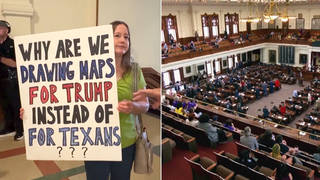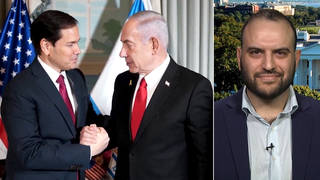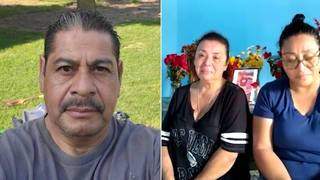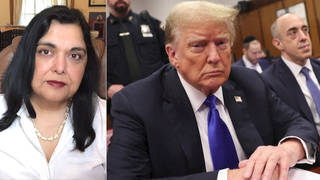
Topics
Guests
- John Nicholspolitical writer for The Nation. His latest piece is headlined “A GOP Debate Without a Winner—Or Much of a Point.” He’s the author of Uprising: How Wisconsin Renewed the Politics of Protest, from Madison to Wall Street.
Initially viewed as a GOP front-runner and backed by over $130 million from wealthy donors, former Florida Gov. Jeb Bush is struggling in fourth place. Highlighting his fading chances, Bush spoke less than any other candidate at Wednesday’s debate and failed to seize opportunities to revive his campaign. “I think Donald Trump has very possibly finished off Jeb Bush by wrapping George W. Bush around him,” says John Nichols, political writer for The Nation.
Transcript
AMY GOODMAN: Now, we haven’t really talked about Jeb Bush. He had less time in this debate than any other candidate. That might go to how much time he was actually given and how much time he took, as well. The reports are his campaign manager, Danny Diaz, was slamming on the CNBC door, demanding that he be given more time, as the debate was going on. The debate did see a heated moment between the third- and fourth-place contenders, Marco Rubio and his mentor, Jeb Bush, the former governor of Florida. The two sparred over criticism that Senator Rubio is more focused on the presidential race than doing his current job as elected senator from Florida.
CARL QUINTANILLA: So when the Sun Sentinel says Rubio should resign, not rip us off, when they say Floridians sent you to Washington to do a job, when they say you act like you hate your job, do you?
SEN. MARCO RUBIO: Yeah, let me say, I read that editorial today with a great amusement. It’s actually evidence of the bias that exists in the American media today.
CARL QUINTANILLA: Well, but do you hate your job?
SEN. MARCO RUBIO: Let me—let me answer your question on the Sun Sentinel editorial today. Back in 2004, one of my predecessors to the Senate by the name of Bob Graham, a Democrat, ran for president, missing over 30 percent of his votes. I don’t recall them calling for his resignation.
CARL QUINTANILLA: Is that the standard?
SEN. MARCO RUBIO: Later that year, in 2004, John Kerry ran for president, missing close to 60 to 70 percent of his votes. I don’t recall the Sun—in fact, the Sun Sentinel endorsed him. In 2008, Barack Obama missed 60 or 70 percent of his votes, and the same newspaper endorsed him again. So this is another example of the double standard that exists in this country between the mainstream media and the conservative movement.
CARL QUINTANILLA: Senator, thank you. John?
JEB BUSH: Could I—could I—could I bring something up here? Because I’m a constituent of the senator, and I helped him, and I expected that he would do constituent service, which means that he shows up to work. He got endorsed by the Sun Sentinel, because he was the most talented guy in the field. He’s a gifted politician. But, Marco, when you signed up for this, this was a six-year term, and you should be showing up to work. I mean, literally, the Senate—what is it, like a French work week? You get like three days where you have to show up? You can campaign—or just resign and let someone else take the job. There are a lot of people living paycheck to paycheck in Florida, as well, that are looking for a senator that will fight for them each and every day.
SEN. MARCO RUBIO: I get to respond, right?
BECKY QUICK: Thirty seconds.
CARL QUINTANILLA: Thirty seconds.
SEN. MARCO RUBIO: All right. Well, it’s interesting. Over the last few weeks, I’ve listened to Jeb, as you’ve walked around the country and said that you’re modeling your campaign after John McCain, that you’re going to launch a furious comeback the way he did, by fighting hard in New Hampshire and places like that—
JEB BUSH: I will.
SEN. MARCO RUBIO: —carrying your own bag at the airport. You know how many votes John McCain missed when he was carrying out that furious comeback that you’re now modeling under?
JEB BUSH: He wasn’t my senator.
SEN. MARCO RUBIO: No, Jeb, I don’t remember—well, let me tell you. I don’t remember you ever complaining about John McCain’s vote record. The only reason why you’re doing it now is because we’re running for the same position, and someone has convinced you that attacking me is going to help you.
JEB BUSH: Well, I’ve been—
SEN. MARCO RUBIO: Here’s the bottom line. I’m not—my campaign is going to be about the future of America. It’s not going to be about attacking anyone else on this stage. I will continue to have tremendous admiration and respect for Governor Bush. I’m not running against Governor Bush, I’m not running against anyone on this stage. I’m running for president because there is no way we can elect Hillary Clinton to continue the policies of Barack Obama.
AMY GOODMAN: That’s presidential candidate Marco Rubio, Florida senator, and speaking to his mentor—I mean, he was really the protégé of Jeb Bush. Now questions are being raised: Is Jeb Bush going to drop out? Carl Quintanilla was the one who asked the question, of CNBC. John Nichols, can you talk about what’s going on here?
JOHN NICHOLS: Well, Jeb Bush came into this debate in a very, very stark position. He had cut his staff pay. He had altered his campaign schedule to go to early states. Essentially, those are the steps you take right before you make that difficult announcement that someone like a Scott Walker has already made, saying that you’re going to suspend your campaign. What Bush needed in this debate was to deliver a stellar performance, to be ahead of the curve at every turn, to jump into questions, and certainly to own those exchanges, like the one you just saw. In fact, he did not do it. You know, he had a quote the other day where he said that he has better things to do; if it doesn’t work out as a presidential candidate, he’s got other stuff to do. In many senses, it looked like he had already made that choice.
That exchange with Rubio should not have gone to Rubio. Rubio was spouting, you know, just canned lines, clearly rehearsed. And the fact of the matter is that after Rubio came back at Bush there, Bush should have come back at him and said, “Look, you were asked a tough question about your attendance, about serving the people. You answered by attacking the media and now by attacking me.” And, you know, the fact of the matter is, Rubio did that throughout the debate. He faced tough questions on his finances, personal finances. He faced tough questions on absenteeism. Again and again, Rubio avoided the questions with canned applause lines. Bush should have called him out.
The challenge for Bush in this debate, though, is a much deeper one. And that is that a number of candidates came into this debate looking to finish Jeb Bush off. That was clearly true of Governor Kasich. That was clearly true of Marco Rubio. I would suggest it was also true of Ted Cruz. And the fact of the matter is, the combination of hits on Jeb Bush, his inept responses to them, made this an absolutely disastrous debate for him. I think he is going to have a very hard time going on.
AMY GOODMAN: Could this also be, overall, not just the debate last night, a referendum on his brother, George W. Bush?
JOHN NICHOLS: Well, and that’s where Donald Trump comes in. You know, I think we’re all talking about Carson today, and I think that’s very appropriate. I’ve enjoyed and respected the analysis. But I would be cautious about ruling Trump out. Trump has been in a couple situations where it looked like he might be losing his momentum, and he turned his fire on another candidate. He clearly did that on Scott Walker, and it was devastating. In the last few weeks, Trump has not been focused on Ben Carson. He has been very focused on Jeb Bush, on finishing Bush off, because Bush is the—still the relatively well-funded establishment candidate. And a big part of that assault has involved George W. Bush. It has been an assault specifically on George W. Bush’s handling of 9/11, his handling of the Iraq War, a host of issues, which historically the left tended to say, “Hey, why aren’t these issues coming up? Why aren’t we talking about Bush’s mistakes, Bush’s missteps?” Well, in fact, Donald Trump did it. And I agree with, I think, the suggestion of your question, Amy. I think that Donald Trump has very possibly finished off Jeb Bush by, you know, wrapping George W. Bush around him.
AMY GOODMAN: We’re going to break and then come back to this discussion. Our guests are John Nichols of The Nation; Jamil Smith of The New Republic; David Cay Johnston, investigative reporter; and Imani Gandy, RH Reality Check. Stay with us.











Media Options